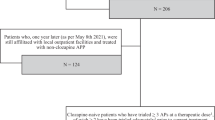Abstract
Clozapine (Clozaril) is a new, powerful, costly anti-psychotic medicine, with a possible serious side effect (agranulocytosis) that entails weekly blood monitoring. In a three hundred bed state mental hospital that is allotted thirty clozapine slots (high costs effectively rationing this drug), a woman with schizophrenia responds minimally to this medication. Her attending physician wishes to withdraw the medicine and give it to another patient with schizophrenia on the ward who might have a better response. The woman's family threatens to make a public outcry. Both the attending physician and the family ask the HEC for a consult.
Similar content being viewed by others
References
Schneiderman LJ, Spragg, RG. Sounding Board: Ethical decisions in discontinuing mechanical ventilation.New England Journal of Medicine. 1988; 318 (15):984–88.
Naber D, Hippius H. The European experience with use of clozapine.Hospital and Community Psychiatry. 1990; 41 (8): 886–90.
Meltzer HY, Burnett S, Bastani B,et al. Effects of six months of clozapine on the quality of life of chronic schizophrenic patients.Hospital and Community Psychiatry. 1990; 41 (8):892–97.
Andreasen NC, Black DW.Introductory textbook of psychiatry. Washington, DC: American Psychiatric Press; 1991.
Salzman C. Notes from a state mental health directors' meeting on clozapine.Hospital and Community Psychiatry. 1990; 41 (8)838–42.
Clozapine access expands.NAMI Advocate. 1991; 12 (4):5.
Kane J, Honigfeld G, Singer J,et al. Clozapine for the treatment-resistant schizophrenic: A double-blind comparison with chlorpromazine.Archives of General Psychiatry. 1988; 45 (9): 789–96.
Reid WH. Access to care: Clozapine in the public sector.Hospital and Community Psychiatry. 1990; 41 (8): 870–74.
Jonsen AR, Siegler M, Winslade WJ.Clinical ethics: A practical approach to ethical decisions in clinical medicine. 3rd ed. New York: McGraw-Hill, Inc.; 1992.
Ereshefsky L, Watanabe MD, Tran-Johnson TK. Clozapine: An atypical antipsychotic agent.Clinical Pharmacy. 1989; 8 (10): 691–709.
Appelbaum, PS. The right to refuse treatment with antipsychotic medications: Retrospect and prospect.American Journal of Psychiatry. 1988; 145 (4):413–19.
Lo B, Jonsen AR. Clinical decisions to limit treatment.Annals of Internal Medicine 1980; 93 (5): 764–68.
Robertson, JA. Second thoughts on living wills.Hastings Center Report. 1990; 21 (6)6–9.
McFarland BH. Discontinuing clozapine: An example of explicit health care rationing.Administration and Policy in Mental Health. 1992; 19 (6):399–416.
Marder SR, Van Putten T. Who should receive clozapine?Archives of General Psychiatry. 1988; 45 (9): 865–67.
Wilson WH. Clinical review of clozapine treatment in a state hospital.Hospital and Community Psychiatry. 1992; 43 (7):700–703.
Wilson WH, Stout DA. The spectrum of clozapine response in refractory schizophrenia.Annals of Clinical Psychiatry. 1992; 4 (3):1–6.
Eichelman B, Hartwig A. Ethical issues in selecting patients for treatment with clozapine: A commentary.Hospital and Community Psychiatry. 1990; 41 (8):880–82.
Jecker NS, Schneiderman LJ. Futility and rationing.American Journal of Medicine. 1992; 92 (2):189–96.
Schneiderman LJ, Jecker NS, Jonsen AR. Medical futility: Its meaning and ethical implications.Annals of Internal Medicine. 1990; 112 (12):949–54.
Maynard EP, Coblens K, Crook Ed,et al. American College of Physicians Ethics Manual. 3rd. ed.Annals of Internal Medicine. 1992; 117 (11):947–60.
Katz J.The silent world of doctor and patient. New York: The Free Press; 1986.
Beresford EB. Uncertainty and the shaping of medical decisions.Hastings Center Report. 1991; 21 (4)6–11.
Hollis M. A death of one's own. In: Bell JM, Mendus S, eds.Philosophy and medical welfare. Cambridge: Press Syndicate of the University of Cambridge; 1988:1–15.
Eth S. Psychiatric ethics: Entering the 1990s.Hospital and Community Psychiatry. 1990; 41 (4):384–86.
Griener GG, Storch JL. Hospital ethics committees: Problems in evaluation.HEC Forum. 1992; 4 (1):5–18.
Scheirton LS. Determinants of hospital ethics committee success.HEC Forum. 1992; 4 (6):342–59.
Jecker NS. Should HECs initiate policies to prevent recurring bioethical dilemmas? Yes: HECs should initiate such policies.HEC Forum. 1992; 4(4):273–76.
Dunn PM. The Health Ethics Network of Oregon: A model to enhance healthcare ethics committee collaboration.HEC Forum. 1992; 4(2):135–48.
Rights and permissions
About this article
Cite this article
Backlar, P., McFarland, B.H. Clozapine rationing in a state mental hospital: Reviewing a HEC's case consultation. HEC Forum 5, 302–318 (1993). https://doi.org/10.1007/BF01560484
Issue Date:
DOI: https://doi.org/10.1007/BF01560484




